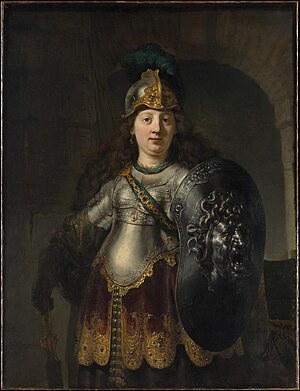Talk:Bellona (goddess)
| This article is rated Start-class on Wikipedia's content assessment scale. It is of interest to the following WikiProjects: | |||||||||||||||||||||||||||||||||||||||||||||||||||
| |||||||||||||||||||||||||||||||||||||||||||||||||||
Wiki Education Foundation-supported course assignment
[edit]![]() This article was the subject of a Wiki Education Foundation-supported course assignment, between 16 August 2021 and 10 December 2021. Further details are available on the course page. Student editor(s): TheRealMithrandir. Peer reviewers: GrantR79.
This article was the subject of a Wiki Education Foundation-supported course assignment, between 16 August 2021 and 10 December 2021. Further details are available on the course page. Student editor(s): TheRealMithrandir. Peer reviewers: GrantR79.
Above undated message substituted from Template:Dashboard.wikiedu.org assignment by PrimeBOT (talk) 15:34, 16 January 2022 (UTC)
Comments
[edit]http://www.ukans.edu/history/index/europe/ancient_rome/E/Gazetteer/Places/Europe/Italy/Lazio/Roma/Rome/.Texts/PLATOP*/TIMELINE.html Bellona's temple vowed in 296 BCE, dedicated some years later.
Bellona and belladonna
[edit]I'd like someone with more moderating skills and a better grasp of English add a mention of the plant belladonna (Atropa belladonna) into this text. The plant was consumed by Bellona's priestesses during rites and rituals.
My sources are mostly in books that aren't in print anymore, but a search returned this link if you wish to check upon a single sentence:
http://www.alchemy-works.com/herb_belladonna.html
- Why is most of this entry about Bellona and why should we add more Bellona material to it? Shouldn't we split the entry up and give Bellona her own entry?
- --Stalfur 13:56, 27 September 2005 (UTC)
- It seems that the entry for Bellona (godess) is redirected to this article. In my view this should be two seperate entries which link to each other.
- --Stalfur 14:11, 28 September 2005 (UTC)
- I'd move the whole thing, without fragmenting it and losing normal context, to Bellona (mythology), in line with many other similar articles. Enyo is a minor personication of the strife of battle in a Greek poem or two, and the editor who noted "frequently depicted as being covered in blood and carrying weapons of war" had never ever seen a Greek depiction of Enyo. --02:28, 15 June 2006 (UTC)
Bellum quod res, bella non sit — Preceding unsigned comment added by 87.20.66.47 (talk) 17:03, 30 January 2015 (UTC)
Roman Database
[edit]Roman Database is a roleplaying site run by 3 administrators-Jackson, son of Vulcan(Hephaestus) and Ceres(Demeter), Lilu, daughter of Pluto (Hades) and Cherri, daughter of Iris. It was created sometime in 2009/2010. The members are, Diane, editor and daughter of Jupiter (Zeus), Clegan, contributor and son of Mars (Ares), Diaamond, Honorary Admin, daughter of Neptune (Poseidon) and Pompona and Latus, follower and son of Apollo and grandson of Aeolus. — Preceding unsigned comment added by Koolmedium (talk • contribs) 22:51, 2 April 2012 (UTC)
Rewrite 2016
[edit]Some statements from the previous version of the article have been deleted. This was largely because they lacked references and looked like private views or generalisations plucked from an unacknowledged blog. Much of the later part of the article was made up of unrelated facts which were beginning to encourage the dumping of irrelevant trivia. This was a pity, since the coverage of Bellona was greatly developed in the centuries between the Renaissance and the start of the 20th century and needed boldly following up. She even inspired a development in feminine headgear, the Bellona cap, which was unfortuntely overtaken by the French Revolution! Mzilikazi1939 (talk) 21:38, 2 February 2016 (UTC)
File:Bellona, by Rembrandt van Rijn.jpg to appear as POTD soon
[edit]Hello! This is a note to let the editors of this article know that File:Bellona, by Rembrandt van Rijn.jpg will be appearing as picture of the day on July 17, 2017. You can view and edit the POTD blurb at Template:POTD/2017-07-17. If this article needs any attention or maintenance, it would be preferable if that could be done before its appearance on the Main Page. — Chris Woodrich (talk) 06:01, 7 July 2017 (UTC)
- Start-Class Classical Greece and Rome articles
- Low-importance Classical Greece and Rome articles
- All WikiProject Classical Greece and Rome pages
- Start-Class Mythology articles
- Low-importance Mythology articles
- Start-Class Women's History articles
- Low-importance Women's History articles
- All WikiProject Women-related pages
- WikiProject Women's History articles
- Start-Class Religion articles
- Low-importance Religion articles
- WikiProject Religion articles
- Start-Class Women in Religion articles
- Low-importance Women in Religion articles




